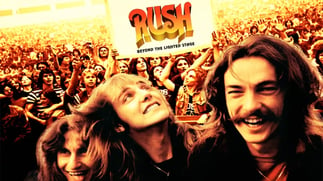WHAT ROCK DOCUMENTARIES CAN TEACH YOU ABOUT CLINICAL VARIATION
- John "JP" Pollard
- 02/9/2022
Like many of you, I watched a fair number of documentaries during the pandemic. Being a musician, I’m drawn to the stories behind some of the greatest rock bands of all time. A few documentaries I enjoyed come to mind: Rush: Beyond the Lighted Stage, Bohemian Rhapsody about Freddie Mercury and Queen, and David Foster: Off the Record.
Listening to Rush behind some admin work recently, it struck me that there are a few lessons in those documentaries for healthcare organizations trying to reduce clinical variation. Read on to see if you agree.
Just give me a hit song
There is a point in both the Rush and Queen documentaries where the record company executives are trying to shape the next albums. These executives were NOT interested in fresh ideas from the band members or exploring many directions. They were only interested in songs that fit their idea of what success looks like: They want a simple hook, in about 3 minutes, without any experimentation. “Just give me something that sounds like a hit.”
Remove access to options
When it comes to reducing clinical variation, healthcare executives can also find themselves attracted to this approach. Simply take away access to options. This might look like restricting the number of physician preferences available, forcing generic prescriptions, or a myriad of other ways to reduce the tools (and options) available to physicians.
So, what’s wrong with that? It reduces costs, doesn’t it? And certainly reduces variation?
It does.
And it also leaves the “artists” out of the discussion.
In both music and in healthcare, leaving the professional practitioners out of the discussion rarely leads to a culture of engagement — even if you do realize some occasional financial gains. 
Members of Rush and Queen were quite upset. Both bands suffered strained relations with their labels and eventually broke contracts over these artistic pressures. No artist wants to be limited in how to create.
Similarly, few physicians like being limited in their approach to care. We are, after all, paying for their expertise.
The David Foster Way
Stick with me as we consider what we might learn from another documentary. This one, David Foster: Off the Record. Foster was a master songwriter and hit maker with stars like Whitney Houston, Michael Jackson, Madonna, Celine Dion, Peter Cetera, and so many others. When you worked with David Foster, you did it David Foster’s way. It’s a little like a clinical decision support (CDS) system telling you “most artists would go for a slight crescendo at this point in the song, why aren’t you?”
I’m being facetious, of course, but the fallout from doing things “The David Foster Way” essentially broke up the band Chicago. Why? David Foster had one way to write a song — his way. He wrote hit songs that featured lead singer Peter Cetera, but were not anything like the funky, horn-driven numbers that originally made Chicago famous. Foster wasn’t interested in what the band wanted to do, he was only interested in doing what he saw as the one. right. way.
Yes, I’m stretching this all to have fun, but physicians can sometimes feel both annoyed and boxed in when a CDS consistently alerts them to issues or second guesses their decisions while they are in the middle of seeing a patient?
The Chicago band mates were furious as David Foster forced Chicago’s sound to morph into David Foster’s sound and Foster eventually convinced Peter Cetera to go solo.
So, then, what is the best approach?
How do we get results AND have a happy artist (or physician)?
Let us circle back to the Rush and Queen documentaries. What happened after their squabbles with their respective labels?
Rush ignored the record company executives and delivered 2112, a concept album that notably included the 20-minute title track, received rave reviews from critics, AND quickly outsold all the band's previous albums.
Queen, also ignoring executives, delivered the album, A Night at the Opera, which contains the six-minute hit, Bohemian Rhapsody, rated by some as the best song of all time.
Both Rush and Queen had an idea of something new that was going to achieve their artistic goals. Goals that, by the way, also made their record companies massive revenues. They didn’t need an executive to tell them what to do, and they didn’t need an inflexible producer to tell them how to write a song. They just needed each other.
How do you create space for “each other” at your organization?
At Agathos, we’ve found a sweet spot that is a little more like a bandmate saying, “Hey, what if we experimented with a different turnaround before the chorus?”
Agathos shows physicians how their practice patterns compare to those of their peers. This piques their curiosity and sparks self-determined change that lowers the cost of care and improves patient outcomes.
We have found that physicians are happy to learn in this manner from peers they respect. The resulting camaraderie creates an engaged culture of excellence — like a band at the height of their success.
And that is what happened with Rush. One reviewer wrote, “The success of this album launched the band into their most prolific and artistically intensive period of their career.”
How cool would that be if your physicians were that engaged?
Yeah, pretty cool.
P.S. If you like rock ‘n’ roll and want an unvarnished view behind the scenes, may I recommend Steve Gorman’s Hard to Handle. Steve was the Black Crowes’ drummer. It has a lot of adult language, but is an unbelievable look into the Black Crowes. I laughed so hard listening to the audio version. Again, you need to be able to handle the language and all that goes with rock 'n' roll.
Rush photo: (Image credit: Rush/Banger Films)
About Author

John "JP" Pollard
JP has over 25 years of marketing experience ranging from executive and product management roles to leadership at award-winning agencies. He has marketed for American Airlines’ SABRE division, SAP’s Germany-based services organization, and also for startups in supply chain technology and healthcare. Prior to joining Agathos in October 2021, JP was VP of marketing for healthcare consulting firm Nordic Consulting Partners (now Nordic Global).

